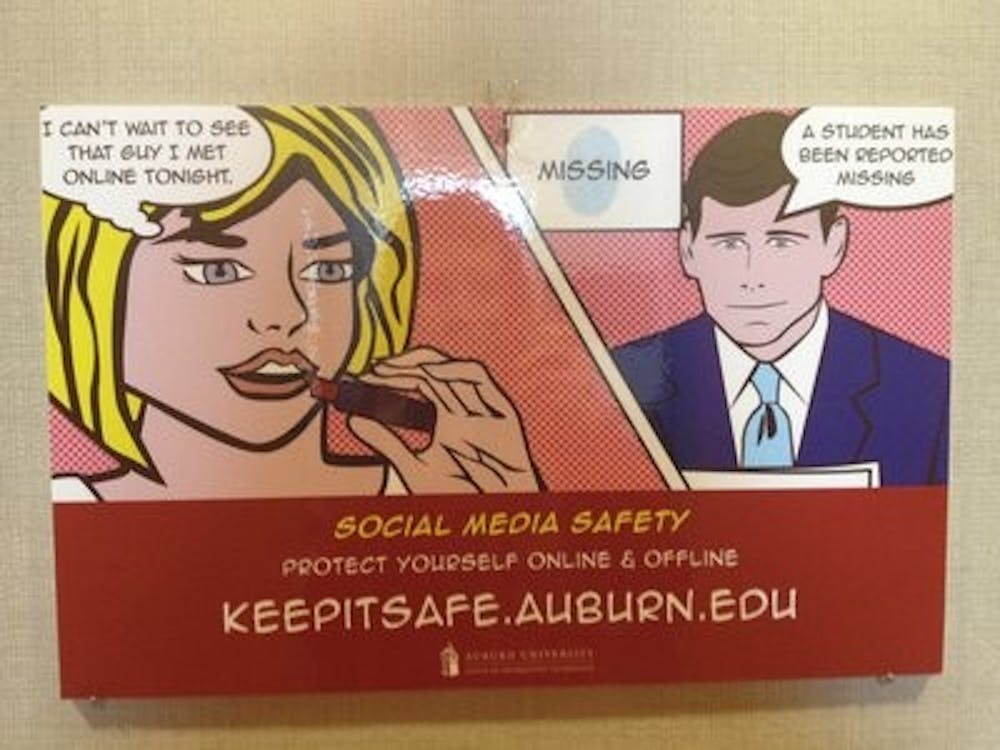Along with Breast Cancer Awareness, October is also Cyber Security Month.
Auburn has promoted Cyber Security Month for seven years-each year including images displaying important topics in technology safety, such as mobile data security, social media safety, copyright infringement and phishing awareness.
"It's an effort to inform citizens, consumers and students about cyber security," said Mark Wilson, information security manager. "(Cyber security) is becoming more of a presence around education with colleges and universities."
Laura Henry, information technology specialist, said the dangers of malicious cyber software are becoming more prevalent.
"Students don't want to have their identity stolen or have money taken out of their bank accounts," Henry said. "It's part of (students') education to now how to stay safe."
With Auburn students being part of a generation heavily dependent on technology and their cell phones, Tyler Atwell, engineering co-op employee, said their generation is the easiest to target.
"Where the older generation would say 'I don't know what I'm doing, so I'm just going to back away,' our generation would say 'I don't know what I'm doing, but I'm going to download everything,'" Atwell said. "A lot of my peers are much more connected, but equally uninformed as well."
Wilson said cyber safety is equivalent to operating a car.
"You just don't get into a car and start driving," Wilson said. "You have to have some knowledge about the laws and traffic rules and how to keep your car in tune. Many of the attacks are coming from social engineering, and students need to know how to protect themselves."
Although software companies have created more programs to protect devices from viruses, harmful agents are using sneakier techniques to gain access to personal information.
"Getting into systems is actually a lot harder, so now (phishing) talking someone into clicking something or downloading something to get a password," Wilson said.
A basic tip for creating a safe technology zone is creating a password for your mobile and computer devices.
"(The password) does not have to have all these symbols in it, but the longer it is the better," Atwell said. "If the password is 11 or 12 characters then it becomes a lot harder to guess."
Also, patching programs on the computer will help protect it from viruses.
"Most of the time, a message will pop up in the corner saying 'your Java needs to update' or 'Adobe Flashplayer has a new update,'" Atwell said. "You need to do it because a lot of times they are patching security bugs."
Wilson also said to be careful about joining random Wi-Fi networks.
"In my opinion if I would jump on a random wireless network I won't do banking transactions on it," Wilson said.
Atwell said non-reputable websites will ask for a username and password, except if logging into the actual website.
"It might say you need to reset your password or go to another website to create a password; that's a sure sign they're trying to steal your data," Atwell said.
For more cyber security information, visit KeepItSafe.Auburn.edu
.Students can also attend the Cyber Security Awareness event Thursday, Oct. 24, from 11 a.m.-1 p.m. in the Student Center.
Staying alert with the guidance of these safety tips will help keep personal information on computers, phones and other devices safe.
"It's an issue that should almost be common sense, but people have a tendency to not think because they think (the website or email) is legitimate," Atwell said.
Do you like this story? The Plainsman doesn't accept money from tuition or student fees, and we don't charge a subscription fee. But you can donate to support The Plainsman.





